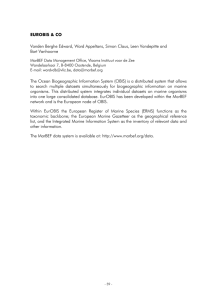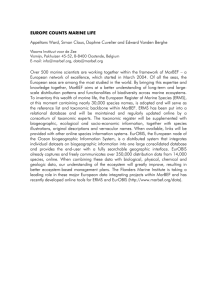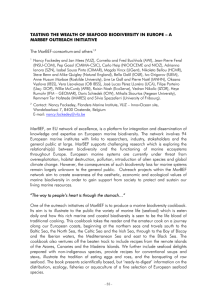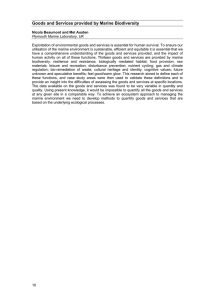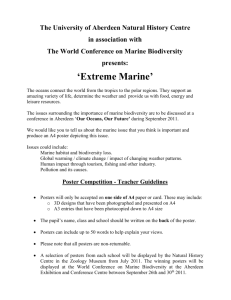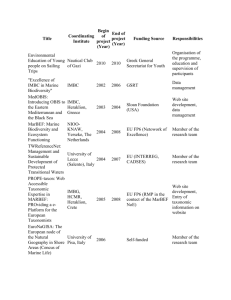THE EU NETWORK OF EXCELLENCE MarBEF: Marine Biodiversity & Ecosystem Functioning
advertisement
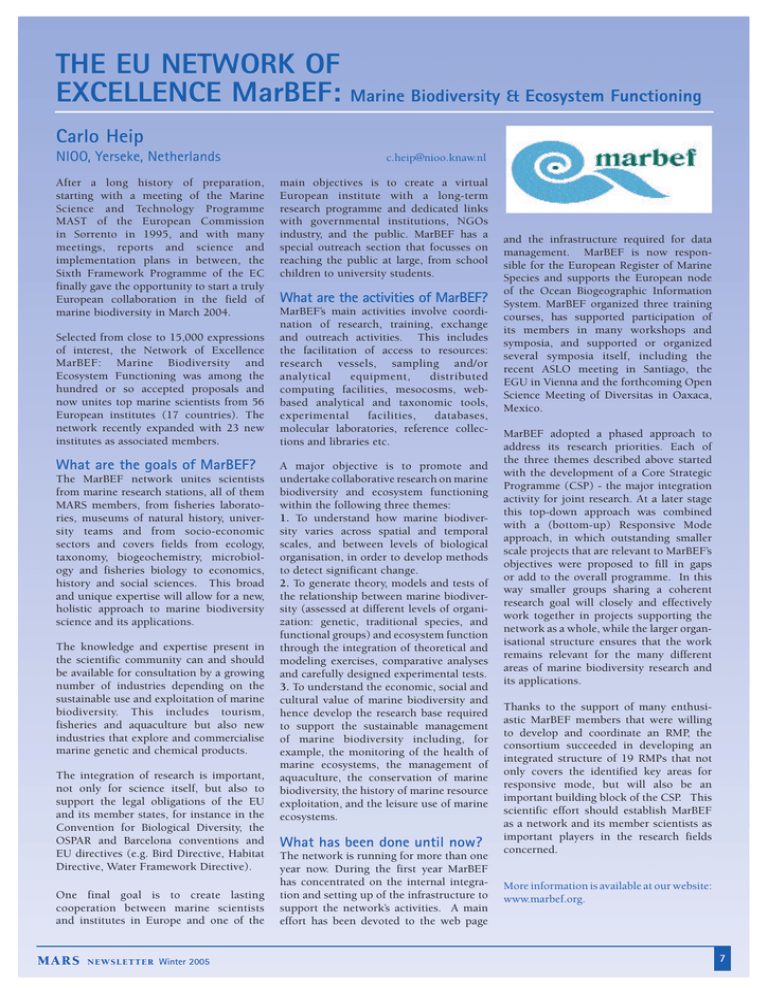
THE EU NETWORK OF EXCELLENCE MarBEF: Marine Biodiversity & Ecosystem Functioning Carlo Heip NIOO, Yerseke, Netherlands After a long history of preparation, starting with a meeting of the Marine Science and Technology Programme MAST of the European Commission in Sorrento in 1995, and with many meetings, reports and science and implementation plans in between, the Sixth Framework Programme of the EC finally gave the opportunity to start a truly European collaboration in the field of marine biodiversity in March 2004. Selected from close to 15,000 expressions of interest, the Network of Excellence MarBEF: Marine Biodiversity and Ecosystem Functioning was among the hundred or so accepted proposals and now unites top marine scientists from 56 European institutes (17 countries). The network recently expanded with 23 new institutes as associated members. What are the goals of MarBEF? The MarBEF network unites scientists from marine research stations, all of them MARS members, from fisheries laboratories, museums of natural history, university teams and from socio-economic sectors and covers fields from ecology, taxonomy, biogeochemistry, microbiology and fisheries biology to economics, history and social sciences. This broad and unique expertise will allow for a new, holistic approach to marine biodiversity science and its applications. The knowledge and expertise present in the scientific community can and should be available for consultation by a growing number of industries depending on the sustainable use and exploitation of marine biodiversity. This includes tourism, fisheries and aquaculture but also new industries that explore and commercialise marine genetic and chemical products. The integration of research is important, not only for science itself, but also to support the legal obligations of the EU and its member states, for instance in the Convention for Biological Diversity, the OSPAR and Barcelona conventions and EU directives (e.g. Bird Directive, Habitat Directive, Water Framework Directive). One final goal is to create lasting cooperation between marine scientists and institutes in Europe and one of the MARS NEWSLETTER Winter 2005 c.heip@nioo.knaw.nl main objectives is to create a virtual European institute with a long-term research programme and dedicated links with governmental institutions, NGOs industry, and the public. MarBEF has a special outreach section that focusses on reaching the public at large, from school children to university students. What are the activities of MarBEF? MarBEF’s main activities involve coordination of research, training, exchange and outreach activities. This includes the facilitation of access to resources: research vessels, sampling and/or analytical equipment, distributed computing facilities, mesocosms, webbased analytical and taxonomic tools, experimental facilities, databases, molecular laboratories, reference collections and libraries etc. A major objective is to promote and undertake collaborative research on marine biodiversity and ecosystem functioning within the following three themes: 1. To understand how marine biodiversity varies across spatial and temporal scales, and between levels of biological organisation, in order to develop methods to detect significant change. 2. To generate theory, models and tests of the relationship between marine biodiversity (assessed at different levels of organization: genetic, traditional species, and functional groups) and ecosystem function through the integration of theoretical and modeling exercises, comparative analyses and carefully designed experimental tests. 3. To understand the economic, social and cultural value of marine biodiversity and hence develop the research base required to support the sustainable management of marine biodiversity including, for example, the monitoring of the health of marine ecosystems, the management of aquaculture, the conservation of marine biodiversity, the history of marine resource exploitation, and the leisure use of marine ecosystems. What has been done until now? The network is running for more than one year now. During the first year MarBEF has concentrated on the internal integration and setting up of the infrastructure to support the network’s activities. A main effort has been devoted to the web page and the infrastructure required for data management. MarBEF is now responsible for the European Register of Marine Species and supports the European node of the Ocean Biogeographic Information System. MarBEF organized three training courses, has supported participation of its members in many workshops and symposia, and supported or organized several symposia itself, including the recent ASLO meeting in Santiago, the EGU in Vienna and the forthcoming Open Science Meeting of Diversitas in Oaxaca, Mexico. MarBEF adopted a phased approach to address its research priorities. Each of the three themes described above started with the development of a Core Strategic Programme (CSP) - the major integration activity for joint research. At a later stage this top-down approach was combined with a (bottom-up) Responsive Mode approach, in which outstanding smaller scale projects that are relevant to MarBEF’s objectives were proposed to fill in gaps or add to the overall programme. In this way smaller groups sharing a coherent research goal will closely and effectively work together in projects supporting the network as a whole, while the larger organisational structure ensures that the work remains relevant for the many different areas of marine biodiversity research and its applications. Thanks to the support of many enthusiastic MarBEF members that were willing to develop and coordinate an RMP, the consortium succeeded in developing an integrated structure of 19 RMPs that not only covers the identified key areas for responsive mode, but will also be an important building block of the CSP. This scientific effort should establish MarBEF as a network and its member scientists as important players in the research fields concerned. More information is available at our website: www.marbef.org. 7
